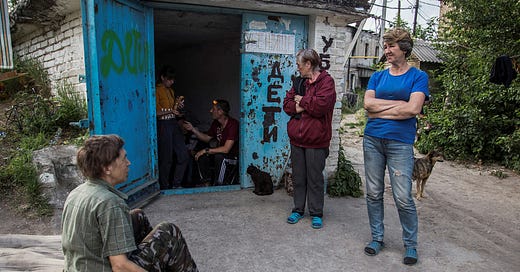Eurasia note #57 - Setting The Silk Road Ablaze
From Kyiv to Samarkand, are geopolitical arsonists lighting multiple fires?
Russian forces take Lysychansk, last city of Lugansk still in Ukrainian hands.
Ukraine kills four in strike on Russian city of Belgorod; perhaps U.S. supplied missiles.
U.S. media regrets how events do not accord with its prediction of imminent victory.
Uzbekistan sees violent protests in autonomous northwest region; shoots protestors.
Is someone disrupting Belt and Road or stirring trouble in Russia’s backyard?
Two strategies: split Russia from China; or ride the dragon over Russia’s steppes.
(2,000 words or about 10 minutes’ read.)
Tbilisi, Jul 4, 2022
While the Western press contends with Ukraine’s latest defeat in Lysychansk and the loss of Lugansk region, Uzbekistan has seen what looks at first glance like a repeat of the protests in Kazakhstan six months ago.
Armed groups stormed government buildings in response to a proposal to revoke the right of secession of northwestern Karakalpakstan. Authorities said a “criminal group” had attempted to seize power in the region, where 2 million people live out of a total national population of 35 million.
At least 18 people were killed in protests that began on Friday and continued through the weekend. President Shavkat Mirziyoyev imposed a state of emergency and curfew.
It is too early to say whether outside provocateurs played a role. With a military-intelligence apparatus inherited from the Soviet Union, they should be alert to political or financial infilitration.
At the same time it seems that a right of secession, in a region where the Karakal may not even represent the majority, and which they would hardly be allowed to win, is a strange hill to die on.
The stability of Central Asia is overstated. It has experienced its share of pot-stirring. Kyrgyzstan’s “Tulip Revolution” in 2005 was partly funded by the U.S. according to the New York Times. [1]
Soon after came the Andijan riots and massacre, in which Uzbek government forces killed hundreds of unarmed people at a public protest in the eastern city.
The Kazakh protests of 2018–2020 and again in 2022, when Russian-led Collective Security Treaty Organization (CSTO) intervened, suggest that the regional powers are alert to instability. Now the pressure comes from multiple directions, food and fuel shortages, supply chain disruptions and the risk of governments defaulting.
No part of the world is immune, from Sri Lanka to Lebanon, to Western countries whose desire to pour weapons into Ukraine, on top of the Covid spending bonanza, will lead to cuts in public spending and higher taxes, while a large part of the population struggles to find medical care to treat what governments have renamed, Sudden Adult Dealth Syndrome.
This is no accident. Sri Lanka is a United Nations model state for carbon reduction. It aims to become carbon neutral and generate 100 per cent of its power from “renewables” by 2050 — in just the next seven years, renewables will go from 20 per cent to 70 per cent of supply.
That is a carbon and renewables target that you might meet by depopulation. How else? [2]
The point is: which of the present crises does not result from government policy? There is none. Every crisis is triggered by or aggravated by NGOs, woke corporations and governments. If you were mad you’d suspect it was coordinated.
They wouldn’t do that
We live in an age of managed outcomes; in which generations are taught from an early age that the world must be a certain way, and everything will just have to comply. Depopulation is perfectly consistent with this world view. The military promotes autism as an advantage — no empathy, way to go!
The West is falling apart:
In June Bulgaria’s pro-Western government collapsed over budgetary pressures and North Macedonia’s accession to the European Union, and faces its fourth election in just over a year.
Estonia’s governing coalition disintegrated, nominally over education, but politicians are divided between pro-NATO and those more open to Russia. The country has sent more aid to Ukraine, per capita, than any other.
Italian parliamentarians protested against the central banker Mario Draghi who was imposed as president in January, saying 70 per cent of Italians oppose arming Ukraine.
In Britain, prime minister Boris Johnson faces a second no-confidence vote.
Is there any need to mention the re-election of Macron, Trudeau and the prospects for Biden?
Perhaps it’s unavoidable that, once we get the promised one world government, the nation states implode.
Military latest
In a serious escalation, Ukrainian forces fired missiles into the Russian city of Belgorod, about 25 miles or 40 kilometers over the national border. Even though Russian air defences shot down three missiles, enough got through to kill four people, damage a dozen apartment buildings and almost 40 private homes.
Some were Ukrainian Tochka-Us. Were they accompanied by the U.S.-supplied HIMARS mobile rocket launchers? If so, that may influence Russia’s response.
The Washington Post at the weekend asked if U.S. assessments of Ukraine’s efforts are too rosy. Some of those interviewed questioned the veracity of what Kyiv tells the Pentagon, including what it does with weapons supplied by the U.S. [3]
Perhaps the Pentagon is feeling sour after Ukrainian generals came out saying half the Javelins don’t work. That’s not a good sales pitch.
Keep reading with a 7-day free trial
Subscribe to Moneycircus to keep reading this post and get 7 days of free access to the full post archives.



